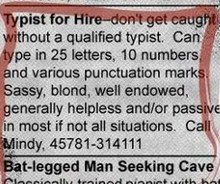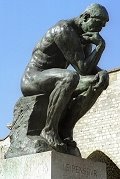I WAS sitting the other
day in what is called
the Peacock Alley of one of our leading hotels,
drinking tea with another thing like myself,
a man. At the next table were a group of Superior
Beings in silk, talking. I couldn't help overhearing
what they said--at least not when I held my head
a little sideways.
They were speaking of the war.
" There wouldn't have been any war," said one,
" if women were allowed to vote."
" No, indeed," chorused all the others.
The woman who had spoken looked about her
defiantly. She wore spectacles and was of the type
that we men used to call, in days when we still
retained a little courage, an Awful Woman.
" When women have the vote," she went on
"there will he no more war. The women will
forbid it."
She gazed about her angrily. She evidently
wanted to be heard. My friend and I hid ourselves
behind a little fern and trembled.
But we listened. We were hoping that the Awful Woman would explain how war would be
ended. She didn't. She went on to explain
instead that when women have the vote there will
be no more poverty, no disease, no germs, no cigarette
smoking and nothing to drink but water.
It seemed a gloomy world.
" Come," whispered my friend, " this is no place
for us. Let us go to the bar."
" No," I said, " leave me. I am going to write
an article on the Woman Question. The time has
come when it has got to be taken up and solved."
So I set myself to write it.
The woman problem may be stated somewhat
after this fashion. The great majority of the
women of to-day find themselves without any
means of support of their own. I refer of course
to the civilised white women. The gay savage in
her jungle, attired in a cocoanut leaf, armed with a
club and adorned with the neck of a soda-water
bottle, is all right. Trouble hasn't reached her yet.
Like all savages, she has a far better time--more
varied, more interesting, more worthy of a human
being--than falls to the lot of the rank and file of
civilised men and women. Very few of us recognise this great truth. We have a mean little
vanity over our civilisation. We are touchy about
it. We do not realise that so far we have done
little but increase the burden of work and multiply the means of death. But for the hope of better
things to come, our civilisation would not seem
worth while.
But this is a digression. Let us go back.
The
great majority of women have no means of support
of their own. This is true also of men. But the
men can acquire means of support. They can hire
themselves out and work. Better still, by the
industrious process of intrigue rightly called " busyness," or business, they may presently get hold of
enough of other people's things to live without
working. Or again, men can, with a fair prospect
of success, enter the criminal class, either in its
lower ranks as a housebreaker, or in its upper ranks,
through politics. Take it all in all a man has a
certain chance to get along in life.
A woman, on the other hand, has little or none.
The world's work is open to her, but she cannot
do it. She lacks the physical strength for laying
bricks or digging coal. If put to work on a steel
beam a hundred feet above the ground, she would
fall off. For the pursuit of business her head is all
wrong. Figures confuse her. She lacks sustained
attention and in point of morals the average woman
is, even for business, too crooked.
This last point is one that will merit a little
emphasis. Men are queer creatures. They are
able to set up a code of rules or a standard, often quite an artificial one and stick to it. They have
acquired the art of playing the game. Eleven men
can put on white flannel trousers and call themselves
a cricket team, on which an entirely new set of
obligations, almost a new set of personalities, are
wrapped about them. Women could never be a
team of anything.
So it is in business. Men are able to maintain a
sort of rough-and-ready code which prescribes the
particular amount of cheating that a man may do
under the rules. This is called business honesty,
and many men adhere to it with dog-like tenacity,
growing old in it, till it is stamped on their grizzled
faces, visibly. They can feel it inside them like a
virtue. So much will they cheat and no more.
Hence men are able to trust one another, knowing
the exact degree of dishonesty they are entitled
to expect.
With women it is entirely different. They bring
to business an unimpaired vision. They see it as
it is. It would be impossible to trust them. They
refuse to play fair.
Thus it comes about that woman is excluded,
to a great extent, from the world's work and the
world's pay.
There is nothing really open to her except one
thing--marriage. She must find a man who will
be willing, in return for her society, to give her half of everything he has, allow her the sole use of his
house during the daytime, pay her taxes, and
provide her clothes.
This was, formerly and for many centuries, not
such a bad solution of the question. The women
did fairly well out of it. It was the habit to marry
early and often. The " house and home " was an
important place. The great majority of people,
high and low, lived on the land. The work of the
wife and the work of the husband ran closely
together. The two were complementary and fitted
into one another. A woman who had to superintend
the baking of bread and the brewing of beer, the
spinning of yarn and the weaving of clothes, could
not complain that her life was incomplete.
Then came the modern age, beginning let us say
about a hundred and fifty years ago. The distinguishing marks of it have been machinery and
the modern city. The age of invention swept the
people off the land. It herded them into factories,
creating out of each man a poor miserable atom
divorced from hereditary ties, with no rights, no
duties, and no place in the world except what his
wages contract may confer on him. Every man
for himself, and sink or swim, became the order
of the day. It was nicknamed " industrial freedom."
The world's production increased enormously. It
is doubtful if the poor profited much. They obtained the modern city--full of light and noise
and excitement, lively with crime and gay with
politics--and the free school where they learned to
read and write, by which means they might hold
a mirror to their poverty and take a good look at it.
They lost the quiet of the country-side, the murmur
of the brook and the inspiration of the open sky.
These are unconscious things, but the peasant who
has been reared among them, for all his unconsciousness, pines and dies without them. It is doubtful
if the poor have gained. The chaw-bacon rustic
who trimmed a hedge in the reign of George I,
compared well with the pale slum-rat of the reign
of George V.
But if the machine age has profoundly altered
the position of the working man, it has done still
more with woman. It has dispossessed her. Her
work has been taken away. The machine does it.
It makes the clothes and brews the beer. The roar
of the vacuum cleaner has hushed the sound of the
broom. The proud proportions of the old-time
cook are dwindled to the slim outline of the gas-
stove expert operating on a beefsteak with the aid
of a thermometer. And at the close of day the
machine, wound with a little key, sings the modern
infant to its sleep, with the faultless lullaby of the
Victrola. The home has passed, or at least is passing out of existence. In place of it is the " apartment "--an incomplete thing, a mere part of
something, where children are an intrusion, where
hospitality is done through a caterer, and where
Christmas is only the twenty-fifth of December.
All this the machine age did for woman. For
a time she suffered--the one thing she had learned,
in the course of centuries, to do with admirable
fitness. With each succeeding decade of the modern
age things grew worse instead of better. The age
for marriage shifted. A wife instead of being a
helpmate had become a burden that must be
carried. It was no longer true that two could live
on less than one. The prudent youth waited till
he could " afford " a wife. Love itself grew timid.
Little Cupid exchanged his bow and arrow for a
book on arithmetic and studied money sums. The
schoolgirl who flew to Gretna Green 3
in a green
and yellow cabriolet beside a peach-faced youth--
angrily pursued by an ancient father of thirty-eight
--all this drifted into the pictures of the past,
romantic but quite impossible.
Thus the unmarried woman, a quite distinct thing
from the " old maid " of ancient times, came into
existence, and multiplied and increased till there
were millions of her.
Then there rose up in our own time, or within
call of it, a deliverer. It was the Awful Woman
with the Spectacles, and the doctrine that she preached was Woman's Rights. She came as a new
thing, a hatchet in her hand, breaking glass. But
in reality she was no new thing at all, and had her
lineal descent in history from age to age. The
Romans knew her as a sibyl and shuddered at her.
The Middle Ages called her a witch and burnt her.
The ancient law of England named her a scold and
ducked her in a pond. But the men of the modern
age, living indoors and losing something of their
ruder fibre, grew afraid of her. The Awful Woman
--meddlesome, vociferous, intrusive--came into her
own.
Her softer sisters followed her. She became
the leader of her sex. " Things are all wrong," she
screamed, " with the status of women." Therein
she was quite right. " The remedy for it all," she
howled, " is to make women ' free,' to give women
the vote. When once women are ' free ' everything
will be all right." Therein the woman with the
spectacles was, and is, utterly wrong.
The women's vote, when they get it, will leave
women much as they were before.
Let it be admitted quite frankly that women
are going to get the vote. Within a very short
time all over the British Isles and North America--
in the States and the nine provinces of Canada--
woman suffrage will soon be an accomplished fact.
It is a coming event which casts its shadow, or its illumination, in front of it. The woman's vote and
total prohibition are two things that are moving
across the map with gigantic strides. Whether they
are good or bad things is another question. They
are coming. As for the women's vote, it has largely
come. And as for prohibition, it is going to be
recorded as one of the results of the European War,
foreseen by nobody. When the King of England
decided that the way in which he could best help
the country was by giving up drinking, the admission was fatal. It will stand as one of the
landmarks of British history comparable only to
such things as the signing of the Magna Charta
by King John, or the serving out of rum and water
instead of pure rum in the British Navy under
George III.
So the woman's vote and prohibition are coming.
A few rare spots--such as Louisiana, and the City
of New York--will remain and offer here and there
a wet oasis in the desert of dry virtue. Even that
cannot endure. Before many years are past, all over
this continent women with a vote and men without
a drink will stand looking at one another and
wondering, what next ?
For when the vote is reached the woman question
will not be solved but only begun. In and of itself,
a vote is nothing. It neither warms the skin nor
fills the stomach. Very often the privilege of a vote confers nothing but the right to express one's
opinion as to which of two crooks is the crookeder.
But after the women have obtained the vote
the question is, what are they going to do with it ?
The answer is, nothing, or at any rate nothing that
men would not do without them. Their only
visible use of it will be to elect men into office,
Fortunately for us all they will not elect women.
Here and there perhaps at the outset, it will be done
as the result of a sort of spite, a kind of sex antagonism bred by the controversy itself. But, speaking
broadly, the women's vote will not be used to elect
women to office. Women do not think enough of
one another to do that. If they want a lawyer they
consult a man, and those who can afford it have
their clothes made by men, and their cooking done
by a chef. As for their money, no woman would
entrust that to another woman's keeping. They
are far too wise for that.
So the woman's vote will not result in the setting
up of female prime ministers and of parliaments
in which the occupants of the treasury bench cast
languishing eyes across at the flushed faces of the
opposition. From the utter ruin involved in such
an attempt at mixed government, the women
themselves will save us. They will elect men.
They may even pick some good ones. It is a nice
question and will stand thinking about.
But what else, or what further can they do, by
means of their vote and their representatives to
'' emancipate " and " liberate " their sex ?
Many feminists would tell us at once that if women
had the vote they would, first and foremost, throw
everything open to women on the same terms as
men. Whole speeches are made on this point, and
a fine fury thrown into it, often very beautiful
to behold.
The entire idea is a delusion. Practically all of
the world's work is open to women now, wide open.
The only trouble is that they can't do it. There is
nothing to prevent a woman from managing a bank,
or organising a company, or running a department
store, or floating a merger, or building a railway--
except the simple fact that she can't. Here and
there an odd woman does such things, but she is
only the exception that proves the rule. Such
women are merely--and here I am speaking in the
most decorous biological sense--" sports."
The
ordinary woman cannot do the ordinary man's
work. She never has and never will. The reasons
why she can't are so many, that is, she " can't " in
so many different ways, that it is not worth while
to try to name them.
Here and there it is true there are things closed
to women, not by their own inability but by the law.
This is a gross injustice. There is no defence for it. The province in which I live, for example, refuses
to allow women to practise as lawyers. This is
wrong. Women have just as good a right to fail
at being lawyers as they have at anything else. But
even if all these legal disabilities, where they exist,
were removed (as they will be under a woman's
vote) the difference to women at large will be
infinitesimal. A few gifted " sports " will earn
a handsome livelihood, but the woman question
in the larger sense will not move one inch nearer to
solution.
The feminists, in fact, are haunted by the idea
that it is possible for the average woman to have
a life patterned after that of the ordinary man.
They imagine her as having a career, a profession,
a vocation--something which will be her " life
work "--just as selling coal is the life work of the
coal merchant.
If this were so, the whole question would be solved.
Women and men would become equal and independent. It is thus indeed that the feminist sees
them, through the roseate mist created by imagination. Husband and wife appear as a couple of
honourable partners who share a house together.
Each is off to business in the morning. The husband
is, let us say, a stockbroker: the wife manufactures
iron and steel. The wife is a Liberal, the husband
a Conservative. At their dinner they have animated discussion over the tariff till it is time for them to
go to their clubs.
These two impossible creatures haunt the brain
of the feminist and disport them in the pages of the
up-to-date novel;
The whole thing is mere fiction. It is quite
impossible for women--the average and ordinary
women--to go in for having a career. Nature has
forbidden it. The average woman must necessarily
have--I can only give the figures roughly--about
three and a quarter children. She must replace
in the population herself and her husband with
something over to allow for the people who never
marry and for the children that do not reach
maturity. If she fails to do this the population
comes to an end. Any scheme of social life must
allow for these three and a quarter children and
for the years of care that must be devoted to them.
The vacuum cleaner can take the place of the housewife. It cannot replace the mother. No man ever
said his prayers at the knees of a vacuum cleaner,
or drew his first lessons in manliness and worth from
the sweet old-fashioned stories that a vacuum cleaner
told. Feminists of the enraged kind may talk as
they will of the paid attendant and the expert
baby-minder. Fiddlesticks ! These things are a
mere supplement, useful enough but as far away
from the realities of motherhood as the vacuum cleaner itself. But the point is one that need not
be laboured. Sensible people understand it as soon
as said. With fools it is not worth while to argue.
But, it may be urged, there are, even as it is, a
great many women who are working. The wages
that they receive are extremely low. They are lower
in most cases than the wages for the same, or similar
work, done by men. Cannot the woman's vote at
least remedy this ?
Here is something that deserves thinking about
and that is far more nearly within the realm of
what is actual and possible than wild talk of equalising and revolutionising the sexes.
It is quite true that women's work is underpaid.
But this is only a part of a larger social injustice.
The case stands somewhat as follows: Women
get low wages because low wages are all that they
are worth. Taken by itself this is a brutal and
misleading statement. What is meant is this.
The rewards and punishments in the unequal and
ill-adjusted world in which we live are most unfair.
The price of anything--sugar, potatoes, labour, or
anything else--varies according to the supply and
demand : if many people want it and few can supply
it the price goes up: if the contrary it goes down.
If enough cabbages are brought to market they will
not bring a cent a piece, no matter what it cost to
raise them.
On these terms each of us sells his labour. The
lucky ones, with some rare gift, or trained capacity,
or some ability that by mere circumstance happens
to be in a great demand, can sell high. If there
were only one night plumber in a great city, and
the water pipes in a dozen homes of a dozen
millionaires should burst all at once, he might charge
a fee like that of a consulting lawyer.
On the other hand the unlucky sellers whose
numbers are greater than the demand--the mass
of common labourers--get a mere pittance. To
say that their wage represents all that they produce
is to argue in a circle. It is the mere pious quietism
with which the well-to-do man who is afraid to
think boldly on social questions drugs his conscience
to sleep.
So it stands with women's wages. It is the sheer
numbers of the women themselves, crowding after
the few jobs that they can do, that brings them
down. It has nothing to do with the attitude of
men collectively towards women in the lump. It
cannot be remedied by any form of woman's freedom. Its remedy is bound up with the general
removal of social injustice, the general abolition
of poverty, which is to prove the great question of
the century before us. The question of women's
wages is a part of the wages' question.
To my thinking the whole idea of making women free and equal (politically) with men as a way of
improving their status, starts from a wrong basis
and proceeds in a wrong direction.
Women need not more freedom but less. Social
policy should proceed from the fundamental truth
that women are and must be dependent. If they
cannot be looked after by an individual (a thing on
which they took their chance in earlier days) they
must be looked after by the State. To expect a
woman, for example, if left by the death of her
husband with young children without support to
maintain herself by her own efforts, is the most
absurd mockery of freedom ever devised. Earlier
generations of mankind, for all that they lived in the
jungle and wore cocoanut leaves, knew nothing of it. To turn a girl loose in the world to work for herself,
when there is no work to be had, or none at a price
that will support life, is a social crime.
I am not attempting to show in what way the
principle of woman's dependence should be worked
out in detail in legislation. Nothing short of a
book could deal with it. All that the present essay
attempts is the presentation of a point of view.
I have noticed that my clerical friends, on the
rare occasions when they are privileged to preach
to me, have a way of closing their sermons by
"leaving their congregations with a thought." It is
a good scheme. It suggests an inexhaustible fund of reserve thought not yet tapped. It keeps the congregation, let us hope, in a state of trembling eagerness for the next instalment.
With the readers of this essay I do the same. I
leave them with the thought that perhaps in the
modern age it is not the increased freedom of
woman that is needed but the increased recognition
of their dependence. Let the reader remain
agonised over that till I write something else.
SOURCE:
Leacock, Stephen. Essays and Literary Studies, The Mayflower
Press, Plymouth, Great Britain, 1916.
Search This Blog
The Jiggly Room
Polk High
The Encyclopedia Marxofeminist

Feminist "Equality" Includes The Loss of Free Speech
Sheeple Fighting Back!
- Black Sheep - You Tube (2min)
- Symantec (SYMC - NASDAQ) Downgraded to "Sell"
- Problems With Norton Internet Security?
- Cypress CEO Responds to Nun's Urging a "Politically Correct" Board Make-Up
- Do You Believe Women Have the Right to Free Speech?
- Canadian Feminists Getting Worried?
- Seven Ways To Get Traffic Without Google
Not All Women Are Like That! (NAWALT)
Myths, Legends & Religions

You are not god. Learn to observe without judging.

- Cypress CEO Responds to Nun's Urging a 'Politically Correct' Board Make-up
- The Baby Bomb: How the Boomers were Used to Demolish a Culture
- Statement of Bill Wood to the Committee on Ways and Means
- Why Did Feminists Attack the Family? -- by Heretical Sex
- Political Correctness - The Revenge of Marxism -- by Baron Bodissey
- Are Americans Practicing Communism? (The Ten Planks of the Communist Manifesto)
"We can't expect the American People to jump from Capitalism to Communism, but we can assist their elected leaders in giving them small doses of Socialism, until they awaken one day to find that they have Communism." -- Nikita Krushchev

THE ANIMAL FARM REALITY OF "FEMINIST EQUALITY:"
"Differences [between men and women], including the products of social inequality, MAKE UNEQUAL TREATMENT NOT UNEQUAL AT ALL." -- Catharine MacKinnon, "Reflections on Sex Equality Under Law," Yale Law Journal, 1991
Blog Archive
-
▼
2003
(151)
-
▼
January
(150)
- The Woman Question -- by Stephen Leacock (1916)
- Woman's Fickleness -- The Folk-Lore of Women -- by...
- Local Allusions to Women -- The Folk-Lore of Women...
- Red Haired Girls -- The Folk-Lore of Women -- by T...
- Woman's Secrets -- The Folk-Lore of Women -- by T....
- Love Tests -- The Folk-Lore of Women -- by T.F. Th...
- Woman's Hate -- The Folk-Lore of Women -- T.F. Thi...
- Woman's Love -- The Folk-Lore of Women -- T.F. Thi...
- Bad Women -- The Folk-Lore of Women -- T.F. Thiste...
- Woman's Goodness -- The Folk-Lore of Women -- by T...
- Woman's Tongue -- Folk-lore of Women -- by T.F. Th...
- Woman's Eyes -- The Folk-lore of Women -- T.F. Thi...
- Woman's Dress -- The Folk-lore of Women -- by T.F....
- Woman's Beauty -- The Folk-lore of Women -- by T.F...
- Woman's Characteristics -- Folk-lore of Women -- b...
- Preface, The Folk-Lore of Women -- by T.F. Thistel...
- Folklore of Women -- by T.F. Thistelton-Dyer (1906)
- I. On Female Suffrage -- by G.K. Chesterton
- XIV. Folly and Female Education -- by G.K. Chesterton
- V. An Evil Cry -- by G.K. Chesterton
- XII. The Modern Slave -- by G.K. Chesterton
- XI. The Queen and the Suffragettes
- X. The Higher Anarchy -- by G.K. Chesterton
- IX. Sincerity and the Gallows -- by G.K. Chesterton
- VIII. The Brand of the Fleur-de-lis -- by G.K. Che...
- VII. The Modern Surrender of Woman
- VI. The Pedant and the Savage - by G.K. Chesterton
- V. The Coldness of Chloe -- by G.K. Chesterton
- IV. The Romance of Thrift -- by G.K. Chesterton
- III. The Emancipation of Domesticity -- by G.K. Ch...
- II. The Universal Stick -- by G.K. Chesterton
- I. The Unmilitary Suffragette -- by G.K. Chesterton
- III The Common Vision -- by G.K. Chesterton
- II Wisdom And The Weather -- by G.K. Chesterton
- Part One: The Homelessness of Man -- by G.K. Chest...
- What's Wrong With The World -- by G.K. Chesterton ...
- (From) Principles of Psychology -- by William James
- (From) New Introductory Lectures on Psycho-Analysi...
- Need It Be So? - by Leo Tolstoy (1900)
- Virginibus Puerisque - Chapter One - By Robert Lou...
- The Intimate Journal of Henri Amiel: August 8, 1876
- The Intimate Journal of Henri Amiel: May 21, 1868
- A Collection of Writings on Women -- Freiderich Ne...
- The Intimate Journal of Henri Amiel: April 26, 1868
- The Intimate Journal of Henri Amiel: September 17,...
- The Intimate Journal of Henri Amiel: March 25, 1878
- The Intimate Journal of Henri Amiel: March 24, 1878
- The Intimate Journal of Henri Amiel: February 1, 1876
- The Intimate Journal of Henri Amiel: February 15, ...
- The Intimate Journal of Henri Amiel: April 2, 1873
- The Intimate Journal of Henri Amiel: February 16, ...
- The Intimate Journal of Henri Amiel: May 6, 1852
- The Intimate Journal of Henri Amiel: May 3, 1852
- The Intimate Journal of Henri Amiel: April 3, 1873
- The Intimate Journal of Henri Amiel: December 11, ...
- The Intimate Journal of Henri Amiel: April 1, 1870
- The Intimate Journal of Henri Amiel: May 13, 1869
- The Intimate Journal of Henri Amiel: December 26, ...
- The Intimate Journal of Henri Amiel - March 17, 1868
- The Intimate Journal of Henri Amiel (selections)
- Woman/Man -- From Kierkegaard's Journals
- On Women - by Arthur Schopenhauer, 1851
- IN VINO VERITAS (or THE BANQUET) -- by Soren Kierk...
- The Metaphysics of the Love of the Sexes - by Arth...
- Democracy in America, Vol. 2, Ch. XII, "How The Am...
- A Bachelor's Complaint of the Behaviour of Married...
- Tom Pry's Wife -- by Charles Lamb (1775-1834)
- Thomas Jefferson - The Aristocracy of Beauty
- Thomas Jefferson - Random Remarks as a Young Man
- Thomas Jefferson - A Bill for Proportioning Crimes...
- Thomas Jefferson - On Mrs. Merry [Wife of British ...
- Thomas Jefferson - On Marie Antoinette
- Thomas Jefferson - Religion and The University
- Thomas Jefferson - Commerce, War, and Revolution
- Thomas Jefferson - Amazons and Angels
- Thomas Jefferson - On European Education
- Thomas Jefferson (selections)
- Letter to His Son (excerpt) -- by Lord Chesterfiel...
- The Spirit of Laws - Book XXVII
- The Spirit of Laws - Book XIX
- The Spirit of Laws - Book XVII
- The Spirit of Laws - Book XVI
- The Spirit of Laws - Book VII
- The Spirit of Laws (excerpts) -- Baron de Montesqu...
- Man Superior to Woman - Conclusion
- Man Superior to Woman - Chapter Six
- Man Superior to Woman - Chapter Five
- Man Superior to Woman - Chapter Four
- Man Superior to Woman - Chapter Three
- Man Superior to Woman - Chapter Two
- Man Superior to Woman - Chapter One
- Man Superior to Woman - Introduction
- Man Superior to Woman - Dedication to the Ladies
- Man Superior to Woman -- by A Gentleman, 1739
- Memoirs Of Louis XIV And The Regency, Vol. III, Ch...
- "The Man-Woman" -- Hic Mulier, 1620
- The Fifteen Joys of Marriage (first two "joys") --...
- Termination of the Female Sex - Mathieu of Boulogne
- Monstrous Woman - Mathieu of Boulogne
- Mother of Calamity - Mathieu of Boulogne
-
▼
January
(150)

"Only an armed people can be the real bulwark of popular liberty." -- V.I. Lenin
Repeal the Canadian Gun Registry

"A system of licensing and registration is the perfect device to deny gun ownership to the bourgeoisie." -- V.I. Lenin
"We shall destroy you from within!" -- Nikita Krushchev, during the Kitchen Debate, 1959
"Self Made Man" - Sculpture by Bobbie Carlyle
Websites
The Demographic Trap

"Destroy the family, you destroy the country." -- V.I. Lenin
"America is like a healthy body and its resistance is threefold: its patriotism, its morality, and its spiritual life. If we can undermine these three areas, America will collapse from within." -- Josef Stalin
Back to the Bible
A Non-Bible Thumper Point of View
"The aim of socialism is not only to abolish the present division of mankind into smaller states and all-national isolation, not only to bring the nations closer to each other, but also to merge them." -- V.I. Lenin
No Thanks - We'd Rather Be Canadian!
Man-Made Global Warming is a Hoax being used to bring about Global Communism (Globalization)

"Every collectivist revolution rides in on a Trojan horse of 'emergency'. It was the tactic of Lenin, Hitler, and Mussolini. In the collectivist sweep over a dozen minor countries of Europe, it was the cry of men striving to get on horseback. And 'emergency' became the justification of the subsequent steps. This technique of creating emergency is the greatest achievement that demagoguery attains." -- Herbert Hoover
Beware the Cultural Marxism of Environmentalists
"The threat of environmental crisis will be the 'international disaster key' that will unlock the New World Order." -- Mikhail Gorbachev, quoted in "A Special Report: The Wildlands Project Unleashes Its War On Mankind", by Marilyn Brannan, Associate Editor, Monetary & Economic Review, 1996, p. 5

ABOLISH THE UNITED NATIONS
The Marxism of Multi-Culturalism

"Tolerance is how far a mechanical part can deviate from the norm before it screws up the entire machine." -- Any Mechanic
The Grinch That Steals Children's Souls

"Give us the child for 8 years and it will be Bolshevik forever." -- V.I. Lenin
"We must declare openly what is concealed, namely, the political function of the school...It is to construct communist society." -- V.I. Lenin
Extra, Extra!



"The oppressed are allowed once every few years to decide which particular representatives of the oppressing class are to represent them." -- Karl Marx
The Liberal Party of Canada = Cultural Marxist Agenda
- The Real Pierre Trudeau: Father of Canada's Permissive Society -- by Steve Jalsevac
- Pierre Elliot Trudeau - Cultural Marxist Wrapped In a Canadian Flag
- The Multi-Tasking Pink Proletariat
- The Right Dishonourable Paul Martin Wants Canadians to "Give Up A Little Of Our Sovereignty To Make The World Work." -- YouTube 2:38 (Maybe We Should Lock Him Up To Make Canada Work!)
Congratulations, Karl Marx!

Marxism Links (For Researching)

- A Brief Overview of Marxism: "Communist (Community) Oriented Policing" - by Phil Worts
- Antonio Gramsci - Collected Works, including the Prison Notebooks
- Antonio Gramsci's Life & His Marxist Theories Explained
- Communist Manifesto - by Karl Marx & Frederick Engels
- Herbert Marcuse Official Homepage
- Herbert Marcuse, Haters of
- Marxists Internet Archive
- The Conflict Tradition
- Women and Marxism
Rule by Science

Philosophy Corner

“Dialectical thought is related to vulgar thinking in the same way that a motion picture is related to a still photograph. The motion picture does not outlaw the still photograph but combines a series of them according to the laws of motion.” -- Leon Trotsky
Dialectical Thought is a Cornerstone of Marxism, and Feminism (Because They Are One In the Same)
The Marxist Dialectic's Zig-Zag

Wishing to advance in a room full of people, I do not walk through the aisle and straight toward my goal. Nor do I move slowly through the crowd shaking hands with friends and acquaintences, discussing points of interest, gradually nearing the objective. The dialectical pathway is different. It consists of a resolute forward advance followed by an abrubt turn and retreat. Having retreated a distance there is another turn and advance. Through a series of forwardbackward steps the goal is approached. To advance thus is to advance dialectically. The Communist goal is fixed and changeless, but their direction of advance reverses itself from time to time. They approach their goal by going directly away from it a considerable portion of the time. Lenin wrote the textbook, One Step Forward, Two Steps Back. Chinese Communist schoolchildren are taught to do the dialectical march taking three steps forward and two steps back. If we judge where the Communists are going by the direction in which they are moving we will obviously be deceived -- Dr. Fred Schwarz, President of Christian Anti-Communism Crusade
Critical Theory

All's Fair In Love and War


The Matriarchy Lives! (Click Picture)

"I am most anxious to enlist everyone who can speak or write to join in checking this mad, wicked folly of 'Women's Rights', with all its attendant horrors, on which her poor feeble sex is bent, forgetting every sense of womanly feelings and propriety. Feminists ought to get a good whipping. Were woman to 'unsex' themselves by claiming equality with men, they would become the most hateful, heathen and disgusting of beings, and would surely perish without male protection." -- Queen Victoria, 1870


Please Give Manginas the Respect They Deserve: NONE!

























